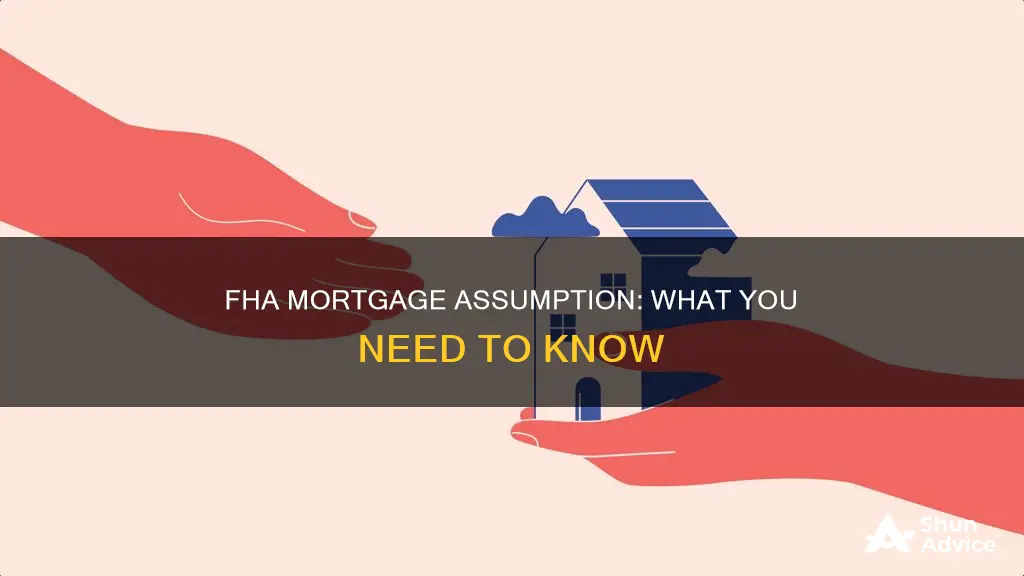
Assuming an FHA mortgage is an option for those looking to purchase a new house. It involves taking on the remaining balance of someone else's FHA loan, including the repayment period and interest rate. This type of transaction is permitted for FHA single-family home loans, but there are certain considerations to keep in mind, such as the date of the original loan and the creditworthiness of the new borrower. While assuming an FHA mortgage can offer access to lower interest rates, it may also require a larger down payment and comes with associated fees and insurance premiums. It is also important to note that the original borrower can be released from loan responsibility if they sign the necessary transfer documentation.
| Characteristics | Values |
|---|---|
| What is an FHA assumable mortgage? | A way to take over a current owner's mortgage, including the repayment period and interest rate. |
| Who can assume an FHA mortgage? | A buyer with a credit score of at least 580 and a debt-to-income ratio of 43% or less. |
| What are the benefits of assuming an FHA mortgage? | Buyers can access lower interest rates, especially when interest rates are rising. Down payments for FHA loans can be as low as 3.5%. |
| What are the potential issues with assuming an FHA mortgage? | Buyers may need to pay a larger down payment if the home's value has increased or if the seller has paid off a significant portion of the mortgage. The original lender can change the terms of the agreement if necessary. |
| What is the process of assuming an FHA mortgage? | The buyer should review their FICO scores, reduce their debt-to-income ratio, and prepare for associated expenses. A home inspection is recommended. The approval process is similar to applying for a new FHA loan, and the lender must approve the sale. |
| What are the costs associated with assuming an FHA mortgage? | Closing costs are typically between 2% and 6% of the home's sale price, and the buyer becomes responsible for ongoing mortgage insurance premiums and other prepaid items. |
| How common is assuming an FHA mortgage? | It is not a very common practice as it requires the seller's participation and can be a lengthy process. |
What You'll Learn

FHA loan rules and credit scores
FHA loans are insured by the Federal Housing Administration, an agency under the US Department of Housing and Urban Development (HUD). FHA loans are a good option for people with low credit scores or financial issues such as bankruptcy on their record.
FHA loans allow home buyers to borrow up to a certain percentage of a home's value, depending on their credit score. A higher credit score will also lower the debt-to-income (DTI) requirements. The FHA usually requires two lines of credit for qualifying applicants. The minimum credit score required for an FHA loan is 500, but many lenders will not accept a score below 580. A credit score of 580 or above allows buyers to borrow up to 96.5% of a home's value, with a minimum down payment of 3.5%. Buyers with a credit score of 500-579 may still qualify for an FHA loan, but they will need to make a larger down payment of at least 10%.
FHA loans are attractive to buyers when interest rates rise because assumable mortgages allow buyers to acquire the remaining balance of the principal loan, which existed before the interest rate rose. However, buyers should be aware that if a particular home has gained value since the original loan was issued, they will need to pay the difference with cash or another loan.
Single Homeowners: Strategies for Affording a Mortgage
You may want to see also

Pros and cons of FHA loans
FHA loans are government-backed mortgages insured by the Federal Housing Administration (FHA), a division of the US Department of Housing and Urban Development (HUD). They are issued by banks or lenders approved by the FHA. The FHA was created to improve access to homeownership for those who may not qualify for conventional financing due to their credit score or debt-to-income ratio (DTI).
Pros
- Lower down payment requirements: FHA loans require a minimum down payment of 3.5% of the loan amount for borrowers with credit scores of 580 or higher. In comparison, conventional loans typically require a 5% down payment.
- More flexible credit score criteria: FHA loans have more lenient borrower requirements, allowing individuals with lower credit scores to qualify. While conventional loans usually require a minimum credit score of 620, you can qualify for an FHA loan with a credit score of 580 or 500, depending on the down payment.
- Reduced debt-to-income ratio requirements: FHA loans are more forgiving of higher debt-to-income ratios compared to conventional loans. While the preferred DTI is 43%, you might qualify for an FHA loan with a DTI of up to 57%.
- Increased accessibility and affordability: FHA loans offer lower financial requirements, making homeownership more accessible to first-time homebuyers and low- to moderate-income households who may not qualify for conventional loans.
- More favourable terms: Since FHA loans are insured by the Federal Housing Administration, they reduce the lender's risk. As a result, lenders can offer more favourable terms to borrowers, such as lower interest rates compared to conventional loans.
Cons
- Higher appraisal standards: FHA loans have higher appraisal standards, which can prevent borrowers from purchasing the home they want due to issues such as water damage.
- Additional costs: While FHA loans have similar closing costs to conventional mortgages, they may result in additional monthly costs. Borrowers may have to pay for mortgage insurance premiums, such as the upfront mortgage insurance premium (MIP), which is 2.25% of the loan's value.
- Limitations on loan amounts: There are limits on the maximum loan amount you can borrow with an FHA loan, which vary depending on your location and the number of units in the home.
- Minimum property standards: To qualify for an FHA loan, the property must meet the FHA's minimum property standards. This may limit the range of properties that borrowers can consider.
Requesting a Mortgage Settlement Conference: What You Need to Know
You may want to see also

How to qualify for an FHA loan
An FHA loan is a mortgage insured by the Federal Housing Administration. It is a good option for first-time homebuyers who may not have saved enough for a large down payment. Here are some ways to qualify for an FHA loan:
Credit Score
A good credit score is crucial for qualifying for an FHA loan. The minimum credit score required is 500, but a higher score of 580 or above is preferred. A higher credit score will also allow you to qualify with a higher debt-to-income ratio (DTI). It is important to get your credit score in order before applying for a loan.
Down Payment
The down payment for an FHA loan can be as low as 3.5% of the purchase price. The minimum down payment is linked to your credit score. For a credit score of 580 and above, the minimum down payment is 3.5%. If you can make a 10% down payment, your credit score can be in the 500-579 range.
Debt-to-Income Ratio
Your DTI is calculated by dividing your monthly debts by your monthly gross income. A lower DTI is preferable, but a higher DTI can be offset by a higher credit score. The FHA recommends that your monthly mortgage payment should not exceed 31% of your monthly gross income, and your DTI should ideally be below 43%.
Income and Employment
While there are no specific income requirements for an FHA loan, you must have a steady income and provide proof of employment. Your income must be verifiable through pay stubs, W-2s, federal tax returns, and bank statements.
Property Type and Appraisal
FHA loans are only available for primary residences, and you must occupy the property within 60 days of closing. The property must be appraised by an FHA-approved appraiser, and it should meet the FHA's minimum property standards.
Closing Costs
FHA loans typically have closing costs ranging from 2% to 6% of the home's sale price, which is generally lower than conventional loans. These costs can often be rolled into your loan.
It is important to note that FHA loan requirements may change over time, so it is advisable to stay updated with the latest rules and guidelines. Additionally, consider using a mortgage calculator to estimate your monthly payments and how different down payment amounts can affect them.
TIAA Mortgages: A Comprehensive Comparison Guide
You may want to see also

FHA loan assumption fees
Assuming an FHA loan is an attractive option for buyers when interest rates rise, as they can take advantage of lower rates on pre-existing mortgages. FHA loans are assumable, but with certain rules and requirements.
FHA loan assumption requires a credit check to ensure the borrower is qualified. The person assuming the loan will need to prepare for the transaction in the same way a home buyer would for a typical loan application. This means reviewing FICO scores, reducing debt-to-income ratios, and preparing for any expenses associated with the loan assumption. A credit score of at least 580 and a debt-to-income ratio of 43% or less are among the criteria for assuming an FHA loan.
The Federal Housing Administration (FHA) has recently updated its policies regarding fees associated with assumable mortgage transactions. The maximum allowable fee has been doubled from $900 to $1,800. This fee increase is intended to compensate servicers for the costs associated with processing assumptions at a rate that is more appropriate for today’s market. The base assumption fee for VA loans is $250 for servicers without automatic underwriting authority and $300 for servicers with automatic authority.
For FHA loans being transferred by assumption, fees are capped at $500, unless the transfer is via simple assumption, in which case the maximum fee is $125. The payments and fees associated with an assumable FHA loan also include the upfront mortgage insurance premium, as well as all prepaid items such as homeowners’ insurance, property taxes, service fees, and the initial escrow deposit. Closing costs on assumed government-backed loans are cheaper than the 2% to 6% you’d normally pay to close a loan.
Cashing Out Refinance Mortgages: Strategies for Homeowners
You may want to see also

FHA loan assumption closing costs
FHA loan assumption allows a buyer to take over the seller's existing FHA mortgage directly when buying a house. This is beneficial to both parties, as the buyer can avoid paying high interest rates, and the seller can avoid foreclosure.
The closing costs for an FHA loan assumption are typically between 2% and 6% of the home's sale price, which is significantly lower than the closing costs for a Conventional loan, which can total up to 20%. However, some closing costs will still need to be paid, such as the mortgage lender's assumption fee, the upfront mortgage insurance premium, and prepaid items like homeowner's insurance, property taxes, service fees, and the initial escrow deposit. These costs can vary by state and are generally higher in states with high tax rates.
It's important to note that the approval process for assuming an FHA loan is similar to applying for a new FHA loan. The person assuming the loan should review their FICO scores, reduce their debt-to-income ratios, and prepare for any expenses associated with the loan assumption. Additionally, the original borrower can be released from loan responsibility if they sign the necessary loan transfer documentation.
To summarise, FHA loan assumption closing costs are generally lower than those of Conventional loans, but buyers should still be prepared to pay certain fees and expenses associated with the process.
Mortgages and Inflation: A Dynamic Relationship Explored
You may want to see also
Frequently asked questions
An FHA assumable mortgage allows a buyer to take on the remaining balance of the principal loan. It is a Federal Housing Administration loan, which is government-backed.
An FHA assumable mortgage can be beneficial as it allows buyers to take on a current owner's lower interest rate. It also allows buyers to take on a loan with a lower down payment, as low as 3.5%.
The process of assuming an FHA loan can be time-consuming and requires the seller's participation. It may also require a larger down payment if the home's value has increased.
To assume an FHA mortgage, a buyer must meet the creditworthiness criteria, including a minimum credit score of 580 and a debt-to-income ratio of 43% or less. The buyer must also pay associated fees and insurance premiums.
To assume an FHA mortgage, you must find a willing seller and ensure the loan meets the criteria for assumption. You will then need to prepare for the transaction as you would for a typical loan application, including reviewing your credit score and finances. Finally, you will need to study the requirements and gather the necessary documents to complete the assumption process.







